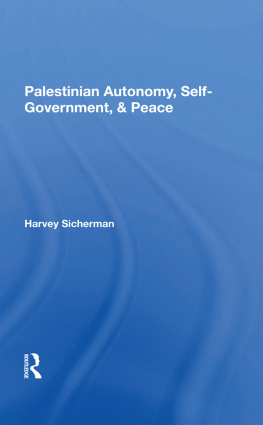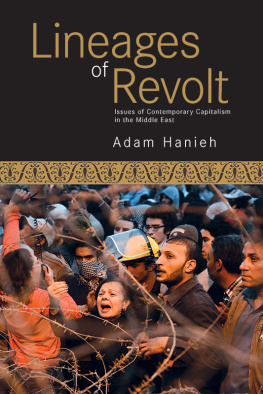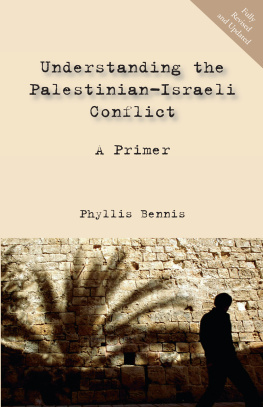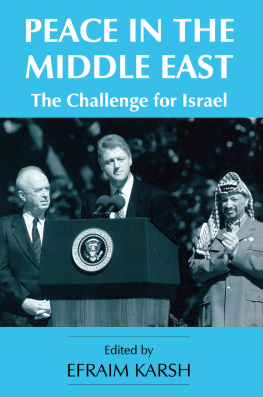Palestinian Autonomy, Self-Government, & Peace
First published 1993 by Westview Press
Published 2019 by Routledge
52 Vanderbilt Avenue, New York, NY 10017
2 Park Square, Milton Park, Abingdon, Oxon OX14 4RN
Routledge is an imprint of the Taylor & Francis Group, an informa business
Copyright 1993 Taylor & Francis
All rights reserved. No part of this book may be reprinted or reproduced or utilised in any form or by any electronic, mechanical, or other means, now known or hereafter invented, including photocopying and recording, or in any information storage or retrieval system, without permission in writing from the publishers.
Notice:
Product or corporate names may be trademarks or registered trademarks, and are used only for identification and explanation without intent to infringe
Library of Congress Cataloging-in-Publication Data
Sicherman, Harvey.
[Palestinian self-government (autonomy)]
Palestinian autonomy, self-government, and peace / by Harvey Sicherman.
p. cm.
Previously published: Palestinian self-government (autonomy).
Washington, D.C. : Washington Institute for Near East Policy,
1991. With new introd.
Includes bibliographical references.
1. Jewish-Arab relations1973- . 2. Paleatinian ArabsPolitics
and government. 3. Autonomy. 4. Egypt. Treaties, etc., Israel,
1978 Sept. 17 (Framework for Peace in the Middle East) 5. United
StatesForeign relationsMiddle East. 6. Middle EastForeign
relationsUnited States. 7. United StatesForeign relations19771981.
8. United StatesForeign relations19811989. I. Title.
DS119.7.S497 1993
956dc20
92-39749
CIP
ISBN 13: 978-0-367-28219-6 (hbk)
Describing the changes of heart and mind that reordered the Middle East in the wake of the First World War, Albert Hourani, one of the great scholars of the modern Middle East, has written: Wars are catalysts, bringing to consciousness feelings hitherto inarticulate and creating expectations of change. The Gulf War of early 1991 bears the signs of having been such a catalyst. Having proved its assertiveness and strength, and having led a wide-ranging coalition into battle, the United States has, since the wars end, embarked on an energetic diplomatic effort aimed at settling the long-standing conflict between the majority of the Arab states and Israel. The peace conference that Secretary of State James A. Baker III has organized will grapple with a number of issues. One of the most contentious and significant will be the future of the Palestinians of Gaza and the West Bank.
We have been down this road before. When Egypt and Israel signed the historic Camp David Accords in 1978, they pledged to negotiate a workable future for the Palestinians, beginning with an interim period of self-government, or autonomy. This first interim goal was never achieved, despite years of diplomatic effort, in large part because the Palestinians themselves chose not to take part in the discussions, a stance that thoughtful Palestinians may now regret. Today, as negotiations between Palestinians and Israelis get under way, the concept of autonomy is sure to be revived, and with it a number of questions: What exactly is this autonomy or, as it is now called, self-government? Where does the idea come from? What kinds of rights and responsibilities might it encompass? What are the chances of its success? And, finally, is it a good idea?
Fortunately, these questions need not be answered in a vacuum. The post-Camp David negotiations between Egypt and Israel and the fits and starts of Mideast diplomacy in the 1980s left behind a fascinating, if largely unexamined, record. Many of the questions sure to arise during the course of this latest round of peacemaking were discussed during earlier diplomatic rounds, and looking at that record can help us understand autonomys meaning, limits, and possibilities.
There are few scholars better equipped to examine the meaning of Palestinian autonomy than Dr. Harvey Sicherman, a seasoned diplomatic historian and veteran of government and a long-time associate of The Washington Institute. In anticipation of the Middle East peace conference he has scoured the written record of earlier autonomy negotiations, interviewed many of the participants, and exhaustively thought through the meaning of that past experience and the message it bears for today. This exceptionally timely, judicious, and gracefully written study is a fine example of the special contribution that scholarship can make to current policy debates.
Barbi Weinberg
President
The Washington Institute for Near East Policy
On November 19, 1977, President Anwar Sadat of Egypt astounded the world when he visited Jerusalem to pursue peace talks directly with Israeli Prime Minister Menachem Begin. Addressing the Knesset the next day, Sadat insisted that a solution to the Arab-Israeli conflict include a Palestinian right to statehood. Thus challenged, some six weeks later Begin unveiled Israels response: self-rule or autonomy for the Palestinian Arabs under Israeli military government.
After excruciating negotiations, a version of this idea of autonomy became part of the Camp David Accords signed by Egypt, Israel, and the United States on September 17, 1978. Unlike the Egyptian-Israeli Peace Treaty, however, Camp Davids full autonomya five-year transitional arrangement for a freely elected self-governing authority (sometimes referred to as an administrative council) for the inhabitants of the West Bank and Gazanever came to fruition. The Palestinians (and Jordan) rejected the idea and, despite intensive negotiations, Egypt, Israel, and the United States could not agree on all of its terms. Then, after three years of effort, Egypt suspended the talks in August of 1982 in response to Israels invasion of Lebanon.
This grim record would seem at first of merely academic interest, another dead end in a conflict full of dead ends. But the autonomy conceptthat of an interim agreement in the West Bank and Gaza giving more government to Palestinians and less control to Israelisdid not perish. The 1980s showed that neither international pressure on behalf of the Palestinian Liberation Organization (PLO) nor the intifadah would force Israel to yield Judea, Samaria, and the Gaza District (as it is known in Israel), or the West Bank and Gaza (as it is known to everyone else), to an Arab sovereignty in a single stepif ever. While the Palestinians and their allies have spent their time and energies pushing for statehood, the number of Israeli settlers in the territories (excluding Jerusalem) has steadily increased from 10,000 in 1980 to more than 100,000 in 1992.
Meanwhile, the Palestinian situation has also grown measurably worse. The hopes raised by the intifadah, by the PLOs dialogue with the United States, and then by Saddam Hussein have all been dashed. Even the demographic situation that for so long argued in favor of the Palestinians has been altered by the influx of great numbers of Soviet Jews into Israel. Clearly an independent Palestinian state seems further than ever from fruition, and a more realistic Palestinian (and Arab) approach may be under way. As Secretary of State James A. Baker III said after his flurry of trips in the spring of 1991, he had found agreement that the negotiations between Israel and the Palestinians would proceed in phases, with talks on interim self-government preceding negotiations over the permanent status of the Occupied Territories.
Notably, of course, the current discussions of such an interim agreement do not include the words autonomy or Camp David. For although the Palestinians and the Arabs may be well on their way toward accepting both the concept and the framework, they do not wish to encumber their journey with embarrassing historical baggage.








